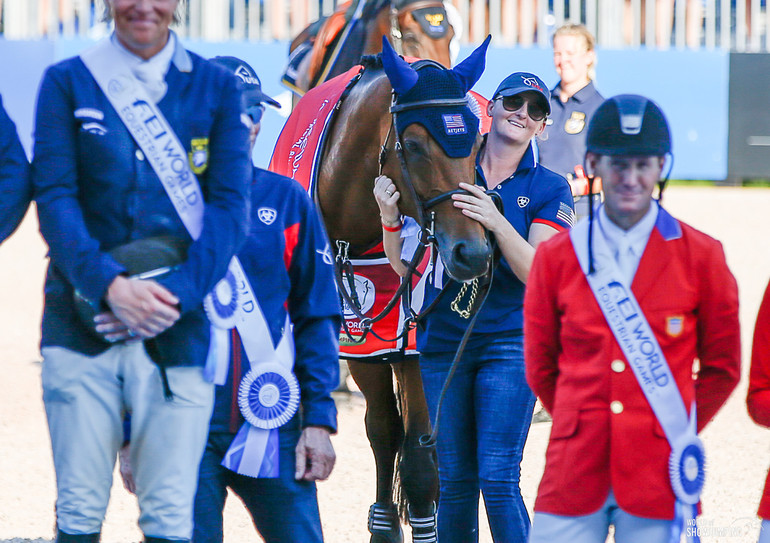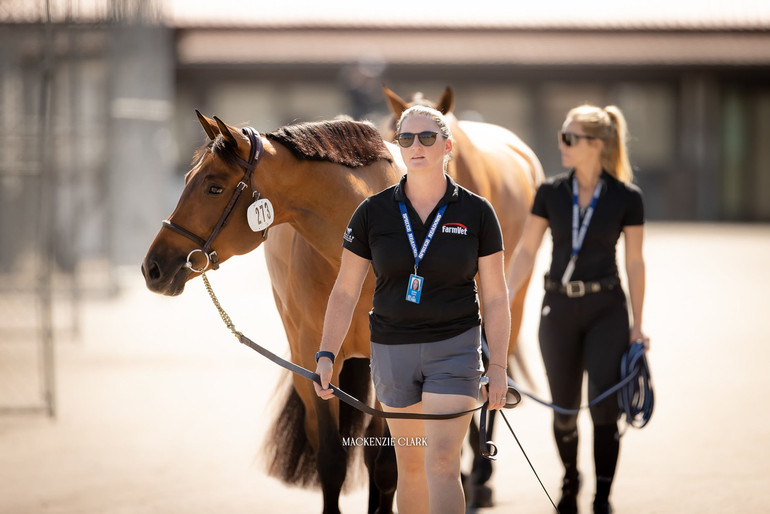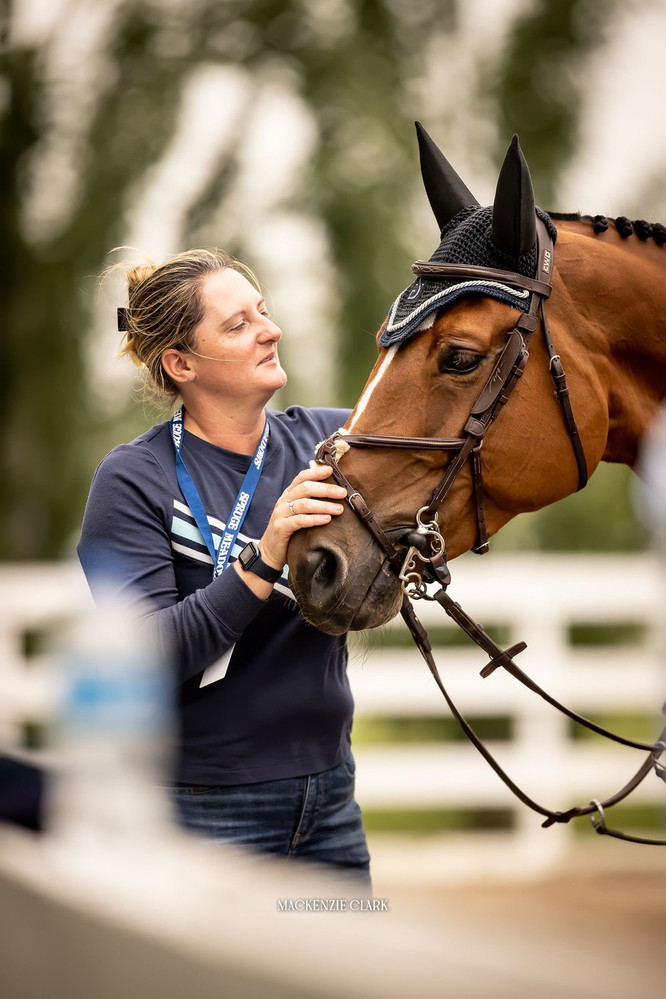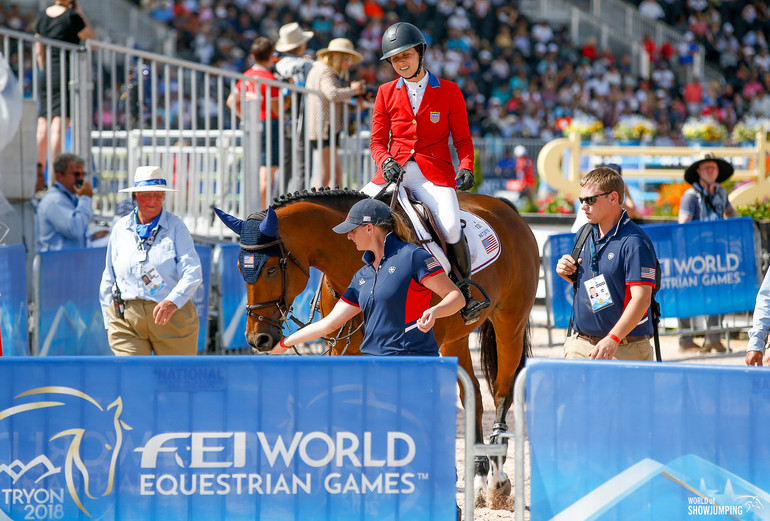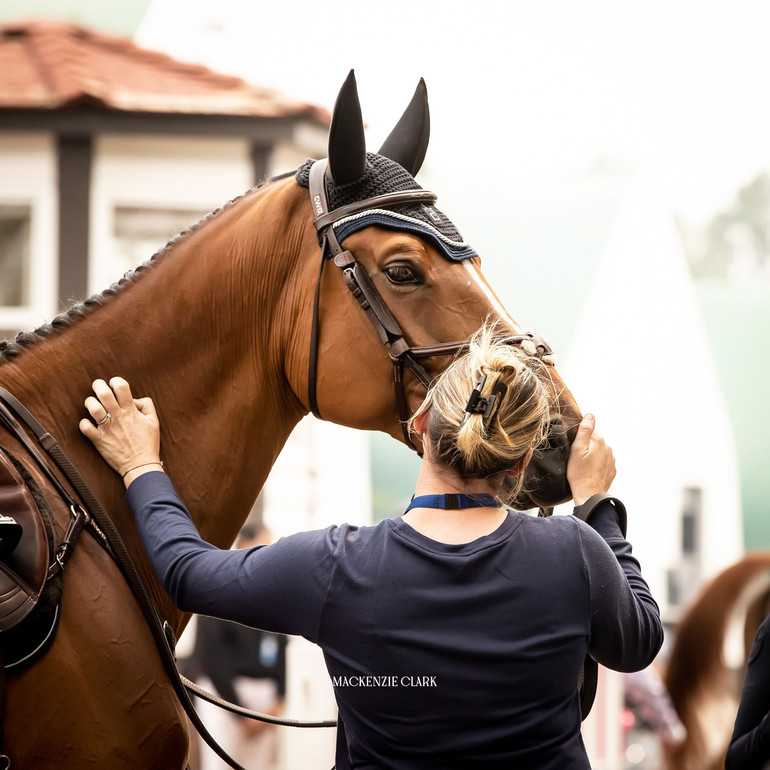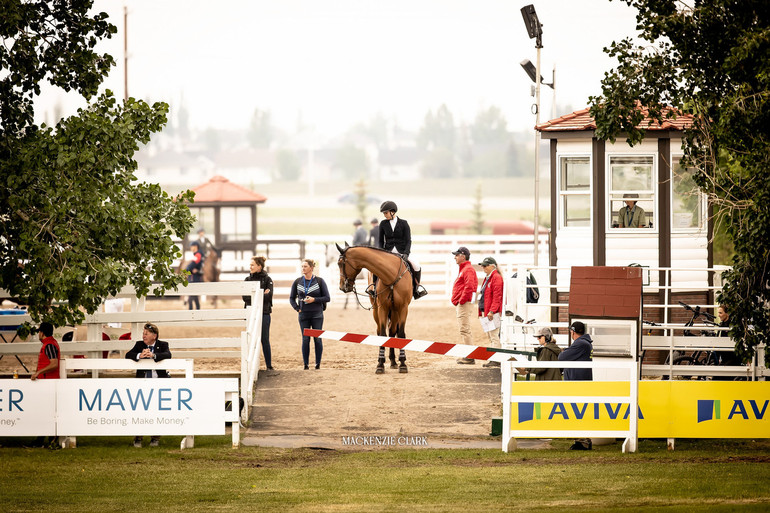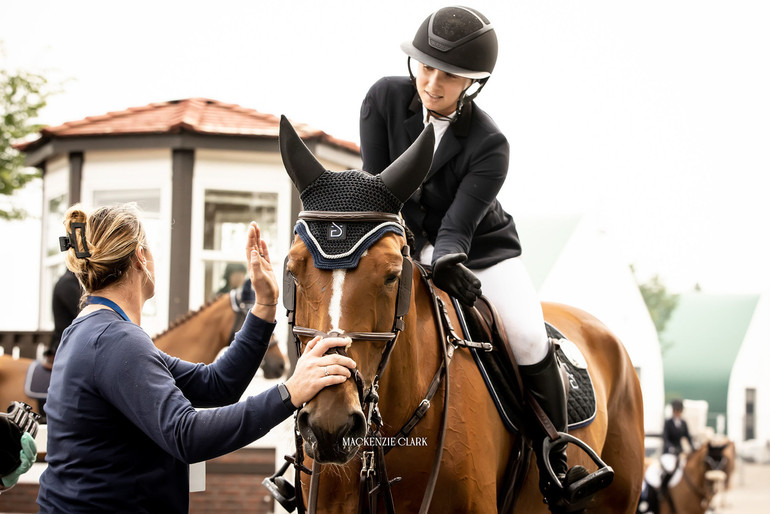Text © World of Showjumping
“I definitely think I'm a little bit the exception and not the rule, because it is very difficult,” Emma Chapman tells World of Showjumping about combining maternity and working with horses. “Obviously, we all do this because we love the horses and love being around them. My maternity leave was the longest time I hadn't been around horses since I was 10 years of age. It was very strange, and I didn't like it at all; I was itching to get back to the barn. When I'm not working, I will sit and watch videos of what happened at shows all over the world that day, and I follow results for everything – I just love this sport.”
Navigating a new reality
For the past seven years, Emma has worked for Adrienne Sternlicht at Starlight Farms as a groom and is currently navigating the combination of motherhood and the job that she loves. “I'm more in a managing role now as opposed to as hands on with the horses as I used to be,” the 35-year-old tells about her position, that has changed after she became a mother. “When I got pregnant, I obviously couldn't be as hands on and do as much as I used to but we are very fortunate as we have great staff here. However, I go wherever I can and I like to be around as much as I can. Even during my maternity leave, I was getting up at 2AM to watch Adrienne and the horses live in the ring at the shows in Europe. This is the first time that I've really had to take a step back and not travel as much, and I'm still learning to navigate it.”
I'm just starting to adapt to this new reality
“My days have changed a little bit now because of my son and I'm just starting to adapt to this new reality. I have a lady who helps me with my son in the mornings until lunchtime and then in the afternoons he is in the barn with me. On a normal day, we all start at 7 AM with giving hay, feeding grain, cleaning the stalls and turning the horses out. I do all of that also and then Adrienne normally starts with her first horse around 8 AM. I am in the ring with Adrienne to set jumps for her, I’m in and out of the barn and I do the paperwork.”
“I've been fortunate to have met my husband in the sport. We both know the working hours and how long the days can be, and we are both very passionate about the sport. Together with Adrienne, we both said from the start that we will see how we can make this situation work. Having my baby in the stables with me in the afternoons and even at the horse shows is only possible with helpful people around me. It takes a village, people who are supportive and willing to try it out. I don't honestly know how it's going to work in the long run, but I'm so lucky as far as the people I have around me.”
Got it from her mother
Emma inherited her love of horses from her mother Carol. “When I was 11, we moved to a rural part of Ireland because my mum wanted to have horses – and so I started; I got a pony. I also started working at a local riding school in the weekends, and I stayed there until I graduated from high school in 2006. The owner of this riding school used to be in the Irish Army, and he was good friends with Jimmy Doyle who works for Georgina Bloomberg. Through that connection, I got a job in Florida after my graduation. I worked for Candice King for one season and it was incredible. I knew I wanted to groom full-time – I didn't really want to do school – so when I came back home, I started working for Conor Swail,” Emma tells.
Emma spent two years with Swail. “I learned a lot from his head groom at the time, Marie Yorke,” Emma tells. “To this day, she is one of the people I call if I have questions. After Conor, I went to work for the Duffy-family. I groomed for Alex and I did two years with him as his main traveling groom; I got to do Nations Cups in Europe and travel all over.”
I have a passion for horses and I love the top of the sport
In the winter of 2011, Emma decided to return to America. “Marie found me a job in the States, working for Ronan McGuigan,” she explains. “I spent six years with Ronan and it was a really good time because I got to do a little bit of everything there. He had a top Grand Prix horse that I took care of, but he also had clients, so you could be at the ring with a pony or an adult amateur jumper, or you could be at the Saturday-night class. I learned a lot about the American system, Ronan’s wife Lisa taught me about managing and I got more responsibility in the barn.”
“I have a passion for horses and I love the top of the sport, and I wanted to get back into that,” Emma explains about her further career path. “I knew of Adrienne and when I heard that there was an opening, I applied – and that was seven years ago. When I started with her, I just groomed and I was very lucky as I got to take care of Cristalline from the start. Wherever she went, I went, which was amazing. I started with Adrianne in 2017 and in 2018 we went to Tryon for the World Equestrian Games where the U.S. squad won team gold.”
Certain horses grab you more than others
“Cristalline for sure is and always will be the one,” Emma says about the horses that have shaped her career. “She was something completely different, simply in her demeanour, in how smart she was. I am yet to meet another horse like her. Capall Zidane, who Ronan rode, was special as well. I started taking care of him at the end of his seventh year and he won my first ever Saturday-night Grand Prix, which was extremely special. He is 20 something now and Ronan's daughter trail rides him, he is just an amazing animal. Benny's Legacy is still up here with us and that horse’s whole character, he just makes me smile. He is a little whirlwind, still at 16 he is flying around in his paddock. I try to be as hands on with him as I can because I enjoy being around him so much.”
Cristalline for sure is and always will be the one
“There are certain horses that grab you more than others but as far as treating certain horses differently in the barn, I don't like that. They all get to spend the same time in the paddock, nobody gets extra special treatment for being a Grand Prix horse. I always try to think that the horses have no idea how much they were bought for or what our expectations of them are, and I approach them that way. Just because you spent a lot of money on them, you can't put them in the paddock in case something happens? I don't agree with any of that. Horses should get time to be horses.”
We all know it’s not a nine-to-five-job
“I don't think as many kids are getting into this side of the sport anymore,” Emma says about the current lack of good staff many in the sport are dealing with. “I think the riders and trainers are starting to realize that when you have good people, you have to really take care of them. We all know this is not a nine-to-five-job, it's not normal days. I think the people doing this job have to be realistic in that sense; you're going to miss out on things like weekends and some family occasions. However, your boss also needs to realize that there are limits; it is about finding a balance.”
Your boss also needs to realize that there are limits; it is about finding a balance
“Each place has their own way of doing certain things,” she continues. “For a new person coming into a barn, I think each side should be very open. I love hearing where other people have been before, if they did things differently, but there has to be openness from both sides. For very new grooms coming into the sport, you just you have to be a sponge. However, it is important to remember that just because you have seen something done one way doesn't mean it is the only way to do it.”
“I'm for anything that helps the grooms and I believe the situation has improved,” Emma says about the increased acknowledgement of grooms and the work they do. “I see for myself the difference in just being able to go get some water or a snack at most of the shows. However, I think there is still a lot of work to do. I think the focus should be broader, starting with adequate facilities. If we are using Porta Potties in the blazing heat in the middle of summer in America, a toilet with some air conditioning as opposed to winning a check at the ring is what I think most of us would appreciate more. I think that's where more of the focus should be.”
Appropriate facilities over water and snacks
“For me, whether a show is good or not is not about whether there is somewhere for the grooms to sit down and have a snack, but how it is for the horses,” Emma points out. “As a groom, you enjoy going to certain shows because you know the stables are clean, there is somewhere to hand graze the horses and the wash places are nice, matted and safe. Those are the shows that you look forward to going to and I feel there aren’t many of them. There are many more facilities that just aren't adequate; you both dread and hate being there, which makes your days feel even longer. Not having adequate facilities makes it harder to do the job – and the job itself is hard enough.”
I feel like you can’t constantly talk about horse welfare and just ignore such basic issues
“I love all the talk that surrounds horse welfare, but I think that's a little bit where the ball gets dropped,” she continues. “People who voice horse welfare don’t come back to the stables and see the horses and their actual surroundings. I believe that if you have a show running for consecutive weeks, there has to be adequate grazing areas for the horses – with the exception of indoors. But a lot of the time, there is nothing. I feel like you can’t constantly talk about horse welfare and just ignore such basic issues.”
“I don’t think that the FEI or the national federations are doing enough, not at all,” Emma points out. “Does anyone inspect the venues when shows apply? I don't think anybody goes and sees if the facilities are even appropriate. I've been doing this for a long time now and I remember when five-star shows were like magical unicorns. Getting to go to a five-star show used to be incredible, but nowadays I feel like you can put that label on a lot of shows only due to the prize money, while they don't live up to that standard in anything else. I think the prize money should not be the only thing that determines the star-level of the show.”
Learn to ask for help
“I'd like to change the expectations of what one person can do,” Emma explains about a mindset that is common among many employers in the equestrian industry. “For sure it's very different in America and Europe, but I think universally, it's a little unrealistic sometimes what one person is expected to do. I understand it's hard to keep the number of horses to grooms ratio optimal because everything costs so much now and in order to have more money coming in, a lot of riders and trainers need to take in more horses, which means more work. We can often feel like we are overstaffed, but if you're able to do that it's better, so that everybody gets their days off every week and when somebody is taking time off, it is not too taxing on everybody else.”
I'd like to change the expectations of what one person can do
“One thing that's quite different in America and in Europe is the driving,” she continues. “Here in the States, we have our own small truck and trailer and if we are doing shows within an hour, we will drive ourselves. However, for anything longer, we do commercial shipping and drive our cars or fly to meet the horses upon arrival. Being on the outside looking to Europe, I think it's crazy that the grooms drive and groom. Talking to a lot of my friends who do it, they do enjoy it, because it is their own space and they can leave when they want. I honestly think they are superhuman, it is amazing that they can drive for a day or two, take care of the horses as soon as they arrive, show for several days and then get in the truck and drive home. It is incredible and I think that is probably one of our main problems as grooms; we want to do everything ourselves.”
“When it gets to a point that we want some help, if we don't feel like going to a show or we don't want to drive the truck one week because we are tired, I wish grooms were heard,” Emma concludes. “When we get to that point where we need to ask for help – and we don't do that a lot of the time – I feel like many grooms won’t say anything because they are afraid of getting pushed back. I've been extremely lucky with all of the people I've worked for and I've never experienced that. As grooms, I believe we need to learn to ask for help when we need it.”
17.10.2024 No reproduction of any of the content in this article will be accepted without a written permission, all rights reserved © World of Showjumping.com. If copyright violations occur, a penalty fee will apply.



